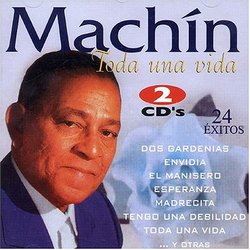| All Artists: Antonio Machin Title: Toda Una Vida: 24 Ă?xitos Members Wishing: 0 Total Copies: 0 Label: MSI:MEDITERRANEO Release Date: 3/23/2004 Album Type: Import Genres: International Music, Jazz, Latin Music Styles: Caribbean & Cuba, Cuba, Big Band, Salsa, Latin Pop Number of Discs: 2 SwapaCD Credits: 2 UPC: 8435108612510 |
Search - Antonio Machin :: Toda Una Vida: 24 Ă?xitos
 | Antonio Machin Toda Una Vida: 24 Ă?xitos Genres: International Music, Jazz, Latin Music
2CD set of the late Cuban tenor and the greatest sonero of the pre-WWII era's hits. Machin broke the color barrier in one of the island's most prestigious orchestras becoming a pivotal figure in the history of Cuban music.... more » |
Larger Image |
CD Details
Synopsis
Album Description
2CD set of the late Cuban tenor and the greatest sonero of the pre-WWII era's hits. Machin broke the color barrier in one of the island's most prestigious orchestras becoming a pivotal figure in the history of Cuban music. His ambition to sing opera was frustrated by the fact that he was born a poor mulatto in his country at the turn of the century. He left Havana for New York in 1930 where he sang "El Manisero" ("The Peanut Vendor"), the first Cuban song to become a national hit in the United States. Machin later relocated in London, Paris and settled in Madrid.

 Track Listings (12) - Disc #1
Track Listings (12) - Disc #1